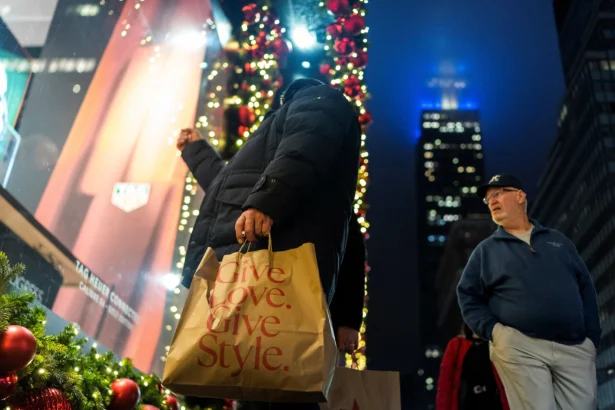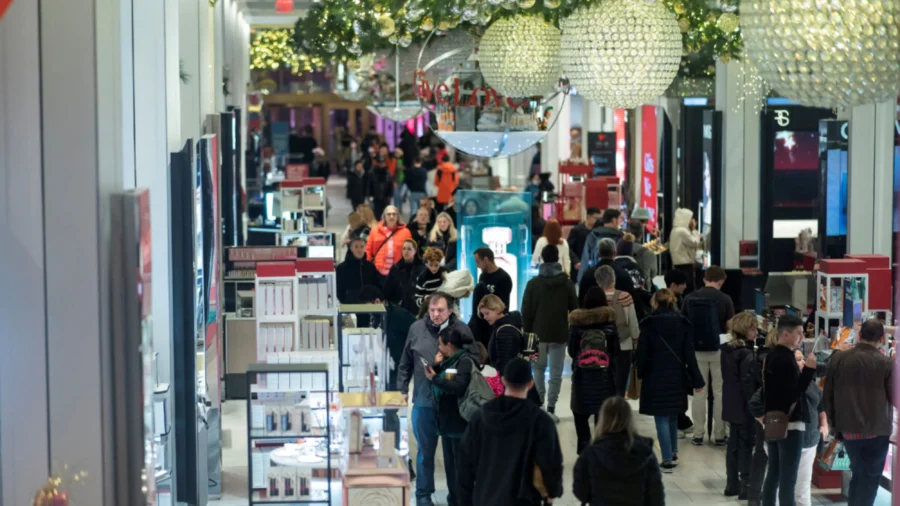NEW YORK—U.S. shoppers are expected to spend a record $18.5 billion using third-party buy now, pay later (BNPL) services for holiday purchases in the last quarter of the year, according to projections by data firm Adobe Analytics released on Wednesday.
With many Americans recently carrying more debt, spending on buy now, pay later services is set to increase by 11.4 percent over the holiday season a year ago, Adobe said.
BNPL services let shoppers expand their purchasing power by paying for merchandise in monthly installments spread out over as many as 36 months; however, the most common payments are four-installment plans.
The expected jump in spending using BNPL exceeds the projected 8.4 percent increase in overall spending in the upcoming holiday shopping period, which could reach about $240.8 billion, according to Adobe Analytics. Its forecast applies to the period between Nov. 1 and Dec. 31.
That means that firms such as Klarna, Afterpay, and Affirm are set to take market share away from debit cards and other forms of payment on purchases of electronics and beauty products for the holidays, a time when many shoppers increase their debt purchasing gifts. Yet some shoppers use credit cards to cover the installment payments due with BNPL services, which consumer watchdogs say could worsen their debt.
Shoppers using credit cards to make BNPL purchases risk putting themselves in a cycle of debt that is difficult to escape, said Delicia Hand, senior director of the digital marketplace at Consumer Reports.
“If the credit card balance isn’t paid in full each month, they will incur interest charges for the buy now, pay later purchases on top of any potential BNPL fees,” Hand said.
U.S. lenders’ net charge-off rates for credit cards, or the amount banks did not expect to collect on the loans, rose to 4.82 percent in the second quarter, according to data from the Federal Deposit Insurance Corporation. That was the highest since 2011.
The New York Fed’s monthly Survey of Consumer Expectations, which among other things asks consumers to estimate the probability of becoming delinquent on a loan in the next three months, was 13.6 percent in August, the highest since a short-lived spike at the onset of the COVID-19 pandemic. The figure was 19.5 percent for those with annual incomes under $50,000.
Nearly 10 percent of BNPL purchases are made using credit cards and automated clearing house transactions, according to the Financial Technology Association, which has Zip and Klarna as members. The FTA said that its members report less than 2 percent delinquency rates for BNPL purchases.

Affirm expects shoppers to hunt for electronics including cellphones, laptops, and headphones this holiday season as they look to replace personal gadgets purchased during the height of the pandemic. The company said beauty will also be a top category for BNPL shoppers purchasing gifts.
Affirm, which can be used at Adidas.com and Bergdorf Goodman.com, allows users to make Pay in 4 purchases and down payments with credit cards, but it does not accept credit payments on most of its loans, according to its website. Affirm also powers Shopify’s BNPL service Shop Pay, which allows credit card transactions on its pay-in-4 product.
Credit card payments make up a “single digit percentage” of the overall payments Affirm collects, according to a company spokesperson.
“In general, we don’t think that a credit repayment for credit is a good thing,” Affirm Chief Operating Officer and Chief Financial Officer Michael Linford said.
Afterpay, which allows pay-in-4 installments at Nike.com and Target.com, accepts payments with credit and debit cards from Mastercard and Visa, according to the company’s website. It does not allow shoppers to use cards issued by other BNPL providers to make purchases.
Klarna accepts debit and credit cards from Visa , Discover, Maestro, and Mastercard; however, shoppers cannot make payment for purchases made with the Klarna card using credit cards.
Mastercard has guidelines for BNPL providers and issuers, according to a company spokesperson. The credit card company continues to review its standards as BNPL via credit cards usages evolve, the spokesperson said.
In May, the U.S. CFPB issued an interpretive rule applying new requirements for BNPL lenders. It requires BNPL companies to investigate consumer disputes, refund products that have been returned and provide periodic billing statements. The companies are not required to assess a consumer’s ability to repay a loan.
American Express lets its users pay BNPL installments with a limited number of BNPL providers, a company spokesperson said.
It also lets its credit card members use its BNPL service Plan It, which is connected to American Express’ physical credit cards.
By Arriana McLymore

